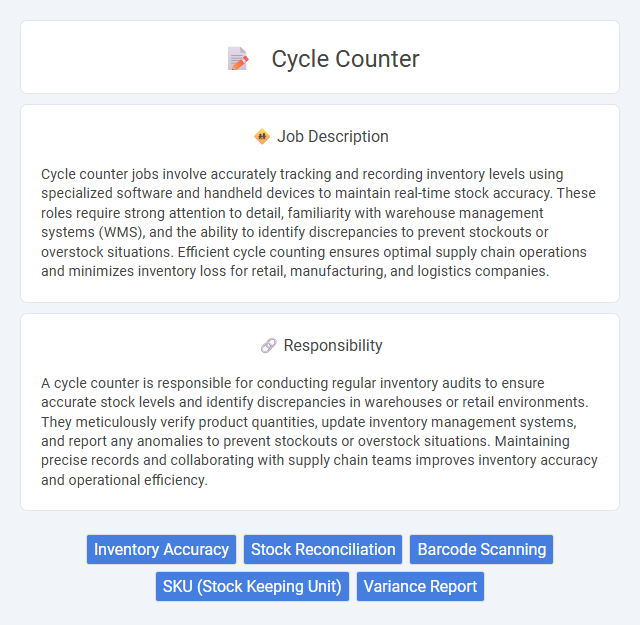
Cycle counter jobs involve accurately tracking and recording inventory levels using specialized software and handheld devices to maintain real-time stock accuracy. These roles require strong attention to detail, familiarity with warehouse management systems (WMS), and the ability to identify discrepancies to prevent stockouts or overstock situations. Efficient cycle counting ensures optimal supply chain operations and minimizes inventory loss for retail, manufacturing, and logistics companies.
Individuals with strong attention to detail and good numerical skills are likely to be suitable for a cycle counter job. Those who prefer repetitive tasks in a stable environment and can maintain focus for extended periods may find this role fitting. Physical stamina might be required, so candidates with the ability to stand or walk for long periods could have a higher probability of succeeding.
Qualification
A cycle counter job requires strong attention to detail and proficiency in inventory management systems to accurately track stock levels and reduce discrepancies. Candidates should possess basic computer skills, experience in data entry, and a solid understanding of warehouse operations. Physical stamina and the ability to perform repetitive tasks efficiently are essential qualifications for success in this role.
Responsibility
A cycle counter is responsible for conducting regular inventory audits to ensure accurate stock levels and identify discrepancies in warehouses or retail environments. They meticulously verify product quantities, update inventory management systems, and report any anomalies to prevent stockouts or overstock situations. Maintaining precise records and collaborating with supply chain teams improves inventory accuracy and operational efficiency.
Benefit
Cycle counter jobs likely offer significant benefits such as improved inventory accuracy, which can reduce stock discrepancies and increase operational efficiency. Employees may gain valuable experience in data management and inventory control, enhancing their career prospects in logistics and supply chain management. Consistent cycle counting can also minimize the likelihood of stockouts or overstock situations, contributing to better customer satisfaction and cost savings.
Challenge
Cycle counter jobs likely present challenges related to maintaining accuracy and efficiency in inventory management within fast-paced environments. The role may require adapting to fluctuating stock levels and resolving discrepancies promptly to ensure seamless operations. Attention to detail and strong organizational skills probably help overcome these obstacles effectively.
Career Advancement
Cycle counter positions provide valuable experience in inventory management and data accuracy, essential skills for advancing into supervisory roles within supply chain operations. Mastery of cycle counting techniques can lead to opportunities as inventory analysts or warehouse managers, emphasizing the importance of attention to detail and process optimization. Developing expertise in inventory software and reporting metrics further enhances career growth potential in logistics and operations management.
Key Terms
Inventory Accuracy
A Cycle Counter plays a crucial role in maintaining high inventory accuracy by performing regular and systematic counts of stock items. This job involves reconciling inventory discrepancies, updating records in real-time, and ensuring data integrity within warehouse management systems. Consistent cycle counting reduces stock variances, supports accurate order fulfillment, and improves overall supply chain efficiency.
Stock Reconciliation
Cycle counters play a crucial role in stock reconciliation by regularly verifying inventory levels through systematic counting, ensuring data accuracy in warehouse management systems. Their job involves identifying discrepancies between physical stock and recorded data, facilitating timely adjustments to minimize inventory shrinkage and improve financial reporting. Effective cycle counting reduces the need for full inventory audits, increases operational efficiency, and supports accurate demand forecasting.
Barcode Scanning
Cycle counter jobs require precise barcode scanning to accurately track and record inventory levels in real-time. Utilizing handheld barcode scanners, cycle counters can efficiently identify product codes and update stock information, minimizing discrepancies and improving warehouse accuracy. Mastery of barcode scanning technology enhances the speed and reliability of inventory audits, supporting overall supply chain optimization.
SKU (Stock Keeping Unit)
Cycle counters perform regular inventory audits by systematically counting SKUs (Stock Keeping Units) to ensure accurate stock levels and reduce discrepancies. They identify variances between physical counts and inventory records, facilitating timely adjustments and improving supply chain efficiency. Accurate SKU cycle counting supports better demand forecasting and inventory management, minimizing stockouts and overstock situations.
Variance Report
A Cycle Counter systematically audits inventory to identify discrepancies between physical stock and inventory records, generating detailed Variance Reports that highlight quantity differences and potential data errors. These Variance Reports are critical for pinpointing specific locations and items with discrepancies, enabling targeted investigation and corrective actions to maintain accurate inventory levels. Accurate Variance Reports support operational efficiency by reducing stockouts, minimizing excess inventory, and improving overall supply chain accuracy.
 kuljobs.com
kuljobs.com